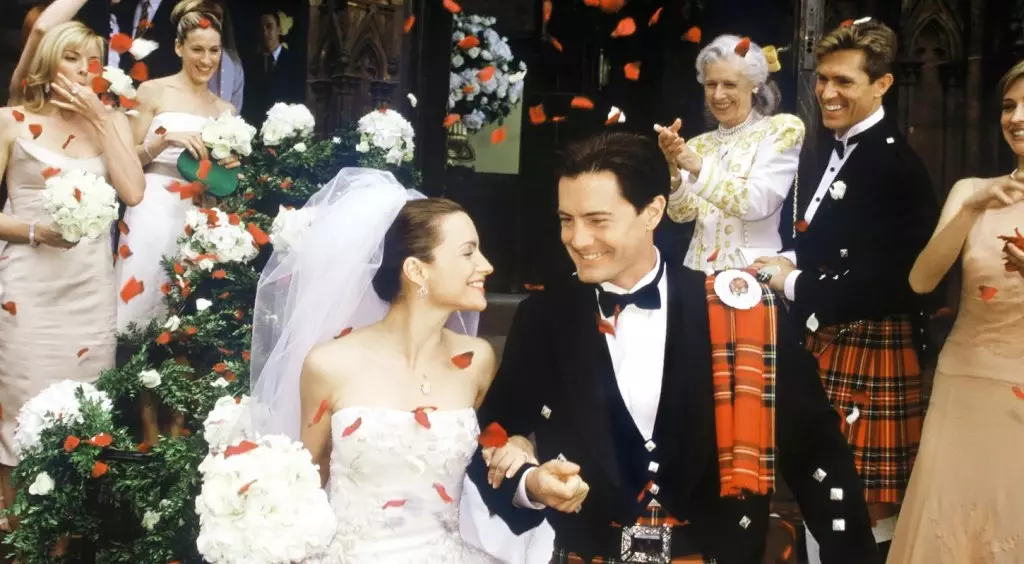In the vibrant tapestry of “Sex and the City,” Charlotte York, portrayed by Kristin Davis, stands out as the quintessential romantic—a woman whose dreams of love mirror the fairytales she adores. While Charlotte finds a semblance of happiness in her marriage to Harry, her journey is painted with intricate shades of longing and nostalgia, particularly concerning her ex-husband, Trey MacDougal. The recent revelations by Davis about a scrapped storyline for the sequel series “And Just Like That…” not only unearth Charlotte’s emotional depth but also serve as a reflection on the complexities of bringing beloved characters back into the fold.
Davis has candidly shared her feelings in a podcast episode titled “Are You A Charlotte?” Her anecdotes reveal the thinker behind the character—someone who acknowledges the baggage Charlotte carries from her previous relationship with Trey, portrayed by Kyle MacLachlan. The idea that they might reconnect in the series was ultimately abandoned, leaving both Davis and fans grappling with the idea of what could have been. This introspection strikes a chord, as it echoes a universal experience: the unresolved feelings of past love.
Behind the Scenes: Creatives and Their Reluctance
The entertainment industry is riddled with hidden narratives; the stories we see on screen often only scratch the surface. Davis remarks that her enthusiasm for MacLachlan’s return may not align with the vision of showrunner Michael Patrick King. It’s an interesting dynamic—actors often invest deeply in their characters, while writers and directors must consider the broader narrative arc and continuity. King’s preference to avoid speculation on in-development storylines highlights the delicate balance between audience engagement and creative control.
Davis’s playful banter with MacLachlan about their hypothetical reunion showcases the longing not just for artistic collaboration but for the magic they created together. Love, like art, evolves, and it’s evident that both Davis and MacLachlan cherish the memories of their time working alongside each other, making the denial of this storyline feel more like a shared loss rather than a simple plot twist.
Longing for Closure: The Significance of Unfinished Business
The idea that Charlotte has had no communication with Trey since their divorce is a provocative twist, breeding fertile ground for exploration of their unresolved narrative. Life becomes increasingly complicated with the passing years, particularly in relation to relationships that were once pivotal. Davis’s insight about Charlotte’s sense of “unfinished feeling” resonates deeply with those who have navigated similar waters, illustrating how past choices can linger long after the moment has passed.
This longing for resolution extends beyond Hollywoodesque romantic entanglements. For many people, encountering an old flame—or even simply reflecting upon what might have been—creates a reflective moment, one steeped in both nostalgia and potential regret. What would happen if these two characters’ paths crossed once more? The audience is invited to reflect on their own romantic histories as they ponder the impact of those pivotal characters from their lives.
A Glimpse into Potential Futures
Davis has expressed hope that Charlotte could run into Trey in an unexpected moment—perhaps at a gala or a café. This notion alone provokes an engaging thought exercise: enjoying glimpses into the lives of characters we once adored, understanding that they, too, have evolved. Such interactions allow for storytelling to bridge the gap between fond memories and the realities of who we have all become.
Though the storyline did not come to fruition, the exploration of Charlotte’s unresolved relationship speaks volumes to Davis’s empathic connection with her character. It demonstrates that the power of storytelling in television transcends mere fiction; it provides a mirror for real-life experiences of love, loss, and the quest for closure. Davis’s candid reflections shine not just on her character’s narrative, but on a broader human experience that remains forever poignant and relatable.
The eagerness to explore these emotions allows viewers to reminisce about their own unfinished chapters, breathing life into contributions from the past that deserve acknowledgment in the present. Ultimately, Davis’s reflections become a longing call: may we cherish the love stories on-screen and off that leave us yearning for more.

